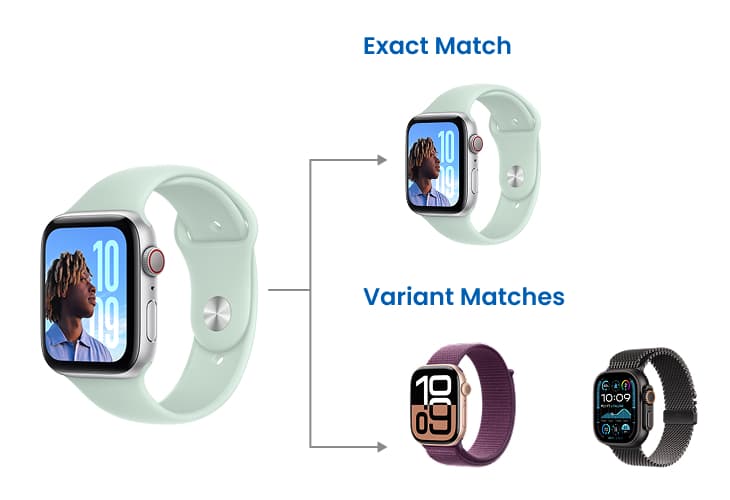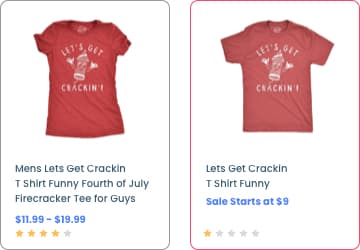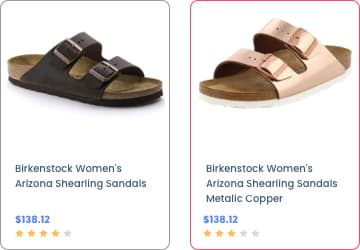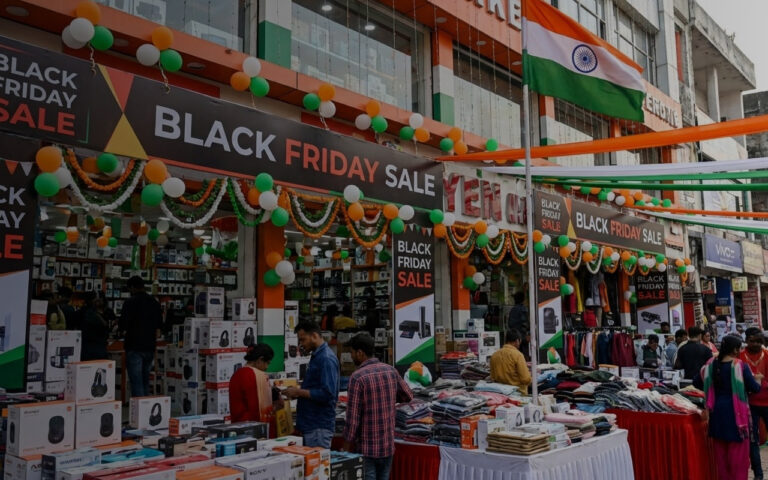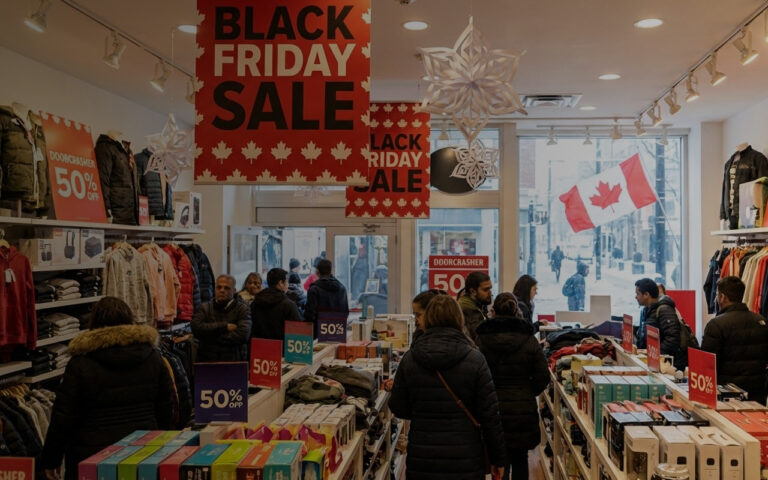DataWeave uses cookies to ensure we give you the best experience on our website. More Info

Product Matching
Match Products Faster and Smarter With Domain-Specific AI
UPC and GTIN codes only take you so far - our AI matches identical, similar, and private label products by comparing attributes, descriptions, and images
Product Matching: What It Means & Why It Counts
Product Matching is grouping ‘exact’ and ‘similar’ products using advanced criteria that goes beyond simple UPC/GTIN matching.
As retailers embrace private label products, product matching ensures accurate matching every time, with no missed matches.
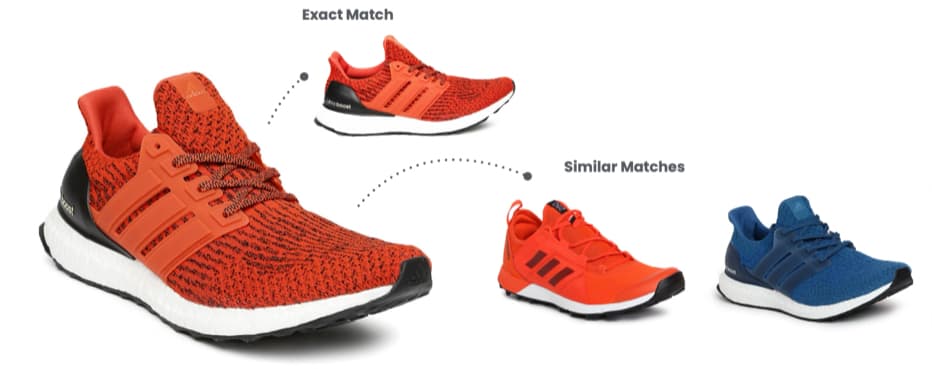
Product Matching Drives Several Strategic Outcomes

Pricing Intelligence
Aligns identical and similar products across competitors for precise price comparisons

Competitive Intelligence
Matches products across retailers for strategic market positioning and analysis

Assortment Planning
Identifies gaps and opportunities by comparing product availability and variations

Content Recommendations
Drives accurate content benchmarking and data-driven content recommendations
Matching Products is No Mean Feat
One Problem,
Many Flavours
What's Similar Varies By Industry
Non-standard and Incomplete Data
Image Variance - Poses, Background, Lighting
One Problem,
Many Flavours
Product matching comes in many flavors — it's more than just finding identical SKUs.
- Exact matches - where all key attributes align across sources.
- Close variants - such as different colors, sizes, or packaging of the same core product.
- Substitutes - products that serve the same purpose but differ in brand, ingredients, or specifications.
- Complementary combos - bundled items that are typically bought together, like a phone and charger or a sofa and ottoman.
What's Similar Varies By Industry
Non-standard and Incomplete Data
How Does DataWeave Match Products?
- We combine product text, images, and deep retail expertise to match products with high accuracy and context awareness.
- Our retail-trained AI pipeline handles everything from data prep to multi-modal classification, at scale.
- Human experts stay in the loop to validate complex or subjective matches, ensuring reliability.
- You get full transparency with clear match stats, accuracy, miss rates, and more.
- The result? 95%+ accuracy and <5% misses across categories, retailers, and formats.
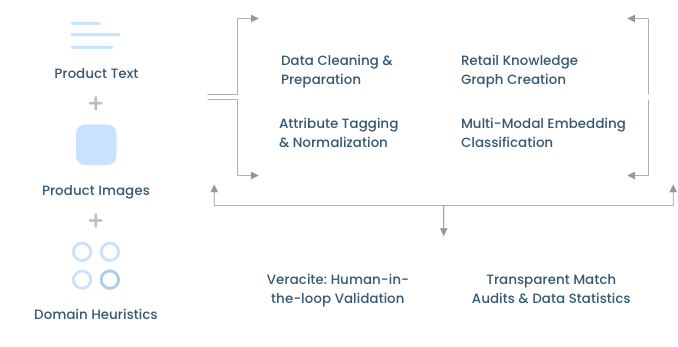
We Match Everything, Everywhere - with Precision
We support all types of product matches across verticals, regions, languages and sales channels.
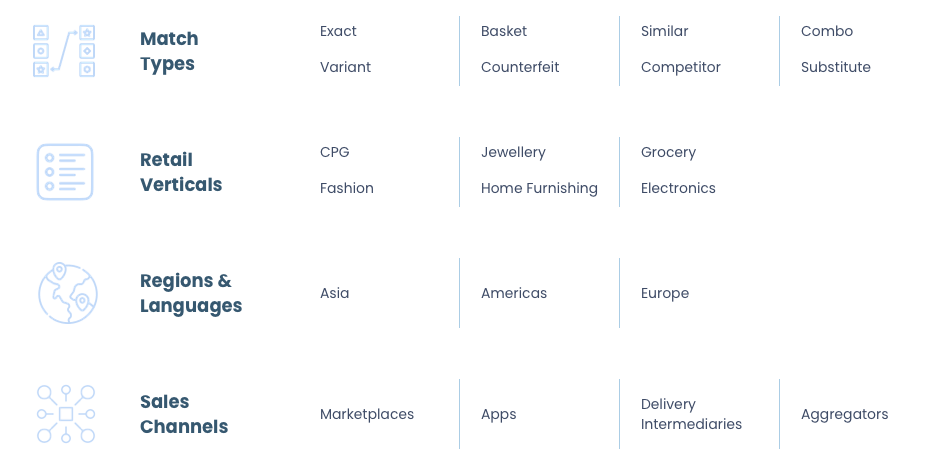
Frequently Asked Questions
What is product matching, and how does it benefit retail businesses?
Product matching identifies identical, similar, or variant products across different retailers, even when listings vary in format or description. This enables price optimization, competitive benchmarking, improved assortment planning, and ensures content accuracy across platforms.
What inputs are required to enable accurate product matching?
You can provide product identifiers such as names, SKUs, UPCs/GTINs, descriptions, and images. The more detailed the inputs, the higher the match accuracy across categories and retailers.
How does DataWeave ensure high accuracy in product matching?
DataWeave combines machine learning, natural language processing, computer vision, and human-in-the-loop validation to deliver 99%+ match accuracy—even when product data is incomplete, inconsistent, or unstructured.
Can the product matching solution handle private labels and custom business rules?
Yes, our solution supports private label-to-brand comparisons and allows customization of matching criteria, such as attribute weighting, category-specific logic, and brand equivalence mapping.
How frequently are product matches updated, and can I manage tracked items dynamically?
Matches are refreshed continuously, with configurable update frequencies. You can add or modify tracked products in real time via our platform or through API-based integrations to support promotions or business shifts.
Have a question or want to learn more?
Contact us today!
Thank you for your interest.
Our representatives will get in touch with you shortly.
-
Pricing Intelligence
- Competitor Price Monitoring
- Product Linking for Consistent Pricing
- Pricing Modeling
- Fuel Price Intelligence
-
Digital Shelf Analytics
- Availability and Pricing
- Share of Search and Media
- Content Audit
- Ratings and Reviews
-
Solutions
- Data Collection API
- Product Matching
- Sentiment Analysis
- Hyperlocal Analysis
- Flyers and Promo Intelligence
- Attribute Extraction and Normalization
-
Why DataWeave
- Accuracy and Coverage
- Veracite
- AI Innovation
-
Connect with us
-
You are viewing our United States website. Select to change.
-
©2026 DataWeave
All rights reserved. Privacy Policy | Current PHP version: 7.0.33-57+ubuntu20.04.1+deb.sury.org+1
no detection done / undefined
Book a Demo
Thank you for your interest.
If your download does not start automatically, click the button above.
Login
For accounts configured with Google ID, use Google login on top.
For accounts using SSO Services, use the button marked "Single Sign-on".
